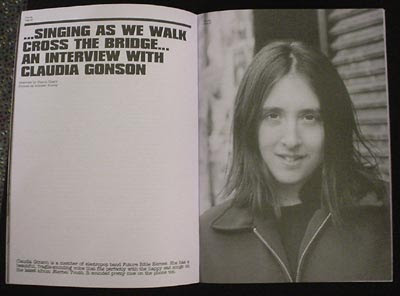 I've decided not to close the year with a Best-of-2008 list because, quite frankly, I haven't read/heard/seen enough genuinely new stuff to fill 10 slots, let alone 10 things that have filled me with such enthusiasm and/or loathing that I can stack them in any particular order. Instead, I've been having one of those tedious internal debates about whether to herald 2009 with a bells-and-whistles redesign for Cultural Snow. I've barely done anything to the default design I picked when I started blogging three (!) years ago, leaving it, as Cath Elliott puts it, looking "too much like a Penguin Classic". I do sometimes feel a bit inadequate when I see the lovely pictures and clever squiggly bits with which the rest of you decorate your sites. I haven't even bothered to add on one of those doodads that tells me when the rest of you have updated. (I did try it, but it made a horrible mess all over my dashboard.) I've just bunged a few widgets down the right-hand margin, and if the spacing goes a bit wonky I just go off and make another cup of tea and hope the Blog Fairy will sort it all out.
I've decided not to close the year with a Best-of-2008 list because, quite frankly, I haven't read/heard/seen enough genuinely new stuff to fill 10 slots, let alone 10 things that have filled me with such enthusiasm and/or loathing that I can stack them in any particular order. Instead, I've been having one of those tedious internal debates about whether to herald 2009 with a bells-and-whistles redesign for Cultural Snow. I've barely done anything to the default design I picked when I started blogging three (!) years ago, leaving it, as Cath Elliott puts it, looking "too much like a Penguin Classic". I do sometimes feel a bit inadequate when I see the lovely pictures and clever squiggly bits with which the rest of you decorate your sites. I haven't even bothered to add on one of those doodads that tells me when the rest of you have updated. (I did try it, but it made a horrible mess all over my dashboard.) I've just bunged a few widgets down the right-hand margin, and if the spacing goes a bit wonky I just go off and make another cup of tea and hope the Blog Fairy will sort it all out.So what's stopping me from creating Cultural Snow 2.0? Well, sheer bloody indolence for one thing; as well as a distinct lack of confidence in my own technical and creative abilities, the dashboard disaster being pretty much par for the course. And I've always been a late and nervous adopter of technological innovations, although I recently discovered that I was only the third person in Bangkok to sign up to Twitter.
I briefly considered following Mr Frith's lead and putting a call out to a hip young designslinger, although that would inevitably create tensions: as well as being indolent and incompetent, I can be a bit of a control freak when I put my mind to it, a lethal combination. But I've also come to the conclusion that now everyone else has a bells-and-whistles blog, mine no longer looks primitive and creaky; it looks minimalist and a wee bit retro. And I'm also reminded a little of Aunt Percy.
Aunt Percy (real name Persimmon) was a character in one of my favourite childhood books, Clement Freud's Grimble. She lived in a tower block where the flats didn't have numbers; instead, they were all painted different colours to distinguish them. Aunt Percy's door was buff. Unfortunately, because all the doors were exposed to the elements, the paint gradually faded, until all the doors were buff. One resident suggested that they should put their names on the door, but Aunt Percy objected. She'd made the right choice of door colour to start with, so why should she have to bother with putting her name up? So all the others put their names on the doors, and underneath they put "and Aunt Percy doesn't live here".
So when Grimble goes round to Aunt Percy's flat for his dinner, because his parents have unexpectedly gone on a cruise to Peru, he knows to look for the door with nothing on it.
Not quite sure where I meant to go with that.
Anyway, in the current turbulent circumstances, the best of good wishes alone can't hope to ensure a happy new year, per se; but let's hope that 2009 will at least be interesting. Even if your front door isn't.





























